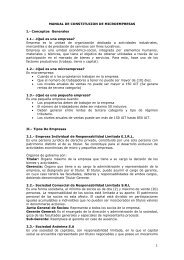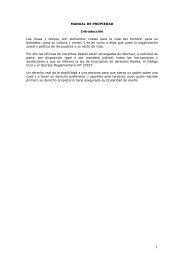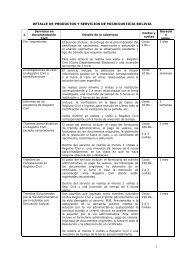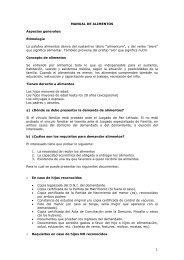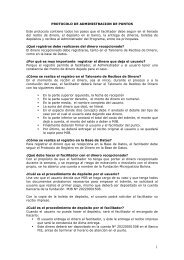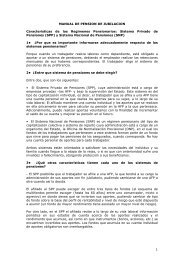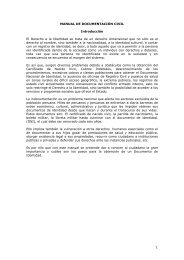ICISS report - International Coalition for the Responsibility to Protect
ICISS report - International Coalition for the Responsibility to Protect
ICISS report - International Coalition for the Responsibility to Protect
Create successful ePaper yourself
Turn your PDF publications into a flip-book with our unique Google optimized e-Paper software.
The <strong>Responsibility</strong> <strong>to</strong> <strong>Protect</strong> 12<br />
2.5 Changing <strong>the</strong> language of <strong>the</strong> debate, while it can remove a barrier <strong>to</strong> effective action,<br />
does not, of course, change <strong>the</strong> substantive issues which have <strong>to</strong> be addressed. There still<br />
remain <strong>to</strong> be argued all <strong>the</strong> moral, legal, political and operational questions – about need,<br />
authority, will and capacity respectively – which have <strong>the</strong>mselves been so difficult and<br />
divisive. But if people are prepared <strong>to</strong> look at all <strong>the</strong>se issues from <strong>the</strong> new perspective that<br />
we propose, it may just make finding agreed answers that much easier.<br />
2.6 In <strong>the</strong> remainder of this chapter we seek <strong>to</strong> make a principled, as well as a practical<br />
and political, case <strong>for</strong> conceptualizing <strong>the</strong> intervention issue in terms of a responsibility <strong>to</strong><br />
protect. The building blocks of <strong>the</strong> argument are first, <strong>the</strong> principles inherent in <strong>the</strong> concept<br />
of sovereignty; and secondly, <strong>the</strong> impact of emerging principles of human rights and human<br />
security, and changing state and intergovernmental practice.<br />
THE MEANING OF SOVEREIGNTY<br />
The Norm of Non-Intervention<br />
2.7 Sovereignty has come <strong>to</strong> signify, in <strong>the</strong> Westphalian concept, <strong>the</strong> legal identity of a<br />
state in international law. It is a concept which provides order, stability and predictability in<br />
international relations since sovereign states are regarded as equal, regardless of comparative<br />
size or wealth. The principle of sovereign equality of states is enshrined in Article 2.1 of <strong>the</strong><br />
UN Charter. Internally, sovereignty signifies <strong>the</strong> capacity <strong>to</strong> make authoritative decisions<br />
with regard <strong>to</strong> <strong>the</strong> people and resources within <strong>the</strong> terri<strong>to</strong>ry of <strong>the</strong> state. Generally, however,<br />
<strong>the</strong> authority of <strong>the</strong> state is not regarded as absolute, but constrained and regulated internally<br />
by constitutional power sharing arrangements.<br />
2.8 A condition of any one state’s sovereignty is a corresponding obligation <strong>to</strong> respect<br />
every o<strong>the</strong>r state’s sovereignty: <strong>the</strong> norm of non-intervention is enshrined in Article 2.7 of<br />
<strong>the</strong> UN Charter. A sovereign state is empowered in international law <strong>to</strong> exercise exclusive<br />
and <strong>to</strong>tal jurisdiction within its terri<strong>to</strong>rial borders. O<strong>the</strong>r states have <strong>the</strong> corresponding duty<br />
not <strong>to</strong> intervene in <strong>the</strong> internal affairs of a sovereign state. If that duty is violated, <strong>the</strong> victim<br />
state has <strong>the</strong> fur<strong>the</strong>r right <strong>to</strong> defend its terri<strong>to</strong>rial integrity and political independence. In<br />
<strong>the</strong> era of decolonization, <strong>the</strong> sovereign equality of states and <strong>the</strong> correlative norm of nonintervention<br />
received its most emphatic affirmation from <strong>the</strong> newly independent states.<br />
2.9 At <strong>the</strong> same time, while intervention <strong>for</strong> human protection purposes was extremely<br />
rare, during <strong>the</strong> Cold War years state practice reflected <strong>the</strong> unwillingness of many countries<br />
<strong>to</strong> give up <strong>the</strong> use of intervention <strong>for</strong> political or o<strong>the</strong>r purposes as an instrument of policy.<br />
Leaders on both sides of <strong>the</strong> ideological divide intervened in support of friendly leaders<br />
against local populations, while also supporting rebel movements and o<strong>the</strong>r opposition<br />
causes in states <strong>to</strong> which <strong>the</strong>y were ideologically opposed. None were prepared <strong>to</strong> rule out<br />
a priori <strong>the</strong> use of <strong>for</strong>ce in ano<strong>the</strong>r country in order <strong>to</strong> rescue nationals who were trapped<br />
and threatened <strong>the</strong>re.<br />
2.10 The established and universally acknowledged right <strong>to</strong> self-defence, embodied in<br />
Article 51 of <strong>the</strong> UN Charter, was sometimes extended <strong>to</strong> include <strong>the</strong> right <strong>to</strong> launch punitive<br />
raids in<strong>to</strong> neighbouring countries that had shown <strong>the</strong>mselves unwilling or unable <strong>to</strong> s<strong>to</strong>p<br />
<strong>the</strong>ir terri<strong>to</strong>ry from being used as a launching pad <strong>for</strong> cross-border armed raids or terrorist<br />
attacks. But all that said, <strong>the</strong> many examples of intervention in actual state practice throughout<br />
<strong>the</strong> 20th century did not lead <strong>to</strong> an abandonment of <strong>the</strong> norm of non-intervention.



